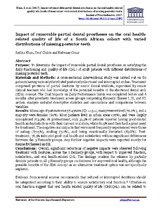| dc.description.abstract | PURPOSE: To determine the impact of removable partial dental prostheses on satisfying the daily functioning and quality of life (QoL) of adult patients with different distributions of missing posterior teeth.
MATERIALS AND METHODS: A cross-sectional interventional study was carried out on 80 patients having variously distributed posteriorly shortened and interrupted arches. Treatment comprised provision of partial dentures by senior dental students, supervised by senior clinical teachers who had knowledge of the potential benefits of the shortened dental arch (SDA) concept. The Oral Impacts on Daily Performance Index was completed before and 6 months after prosthetic treatment across groups comprising Kennedy Classes I, II, and III arches. Analysis included descriptive statistics and associations and comparisons between variables.
RESULTS: Mean age of patients was 57.4 years (SD=13.1),many were retired (72.2%), and a majority were females (60%). Most patients lived in urban areas (95%), and were largely unemployed (63.3%). At pre-treatment, only 31.3% of patients reported having good dental health and satisfaction with their current oral state, while 82.5% said they had a great need for treatment. The negative oral impacts that were most frequently experienced were those of eating (67.5%), smiling (50%), and being emotionally disturbed (63.8%). Post-treatment, 76.3% indicated good oral health and satisfaction with no significant differences between the 3 Kennedy groups. Any further negative impacts were reported mostly for Kennedy Classes I and II.
CONCLUSIONS: Overall, significant reductions of negative impacts were observed following treatment with dentures, across the 3 Kennedy groups,with respect to improved function, satisfaction, and oral health-related QoL. The findings confirm the reliance by partially dentate patients in all 3 Kennedy groups on dentures for improved oral health, although the possible benefits of the SDA concept as an alternative treatment option was not specifically explored. | en_US |

